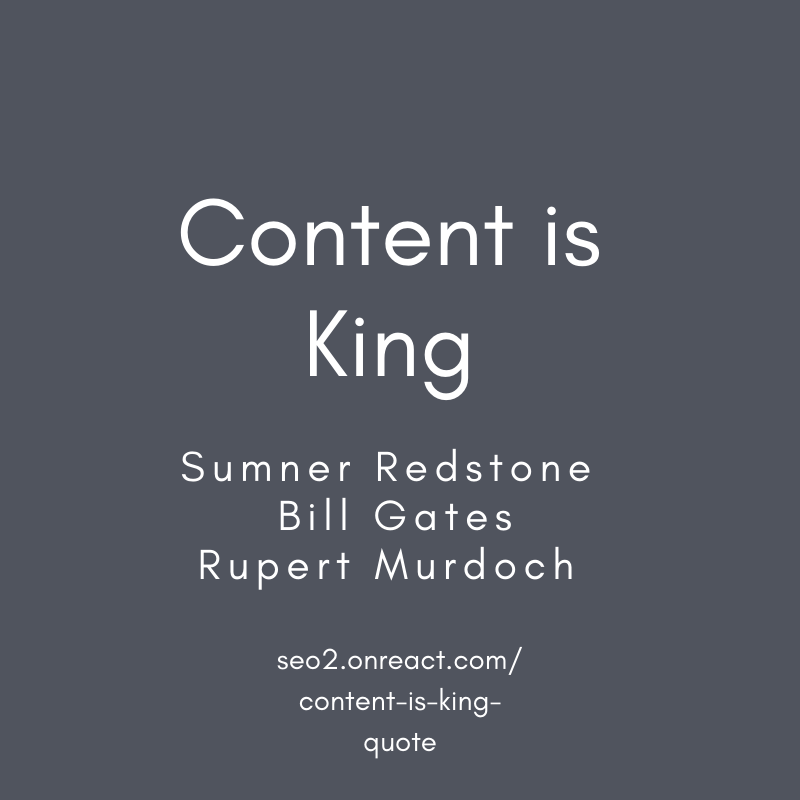
You have probably heard the “content is king” quote a hundred times already.
Did you ever wonder about the actual meaning of it? It’s not what you think!
Billionaires make money off content. Google and Facebook do it that way.
Can you also become rich by content creation because “content is king”? Find out below!
The history of the “Content is King” quote
The “content is king” approach to get hyper-rich is not a new phenomenon though.
Just take a look at who said “content is king” in the past long before every blogger:
- Rupert Murdoch of News Corp reiterated it since 1999
- Bill Gates of Microsoft said it in 1996
- Sumner Redstone of Viacom in 1994
In the video below he explains how he and not Bill Gates “coined” the idiomatic expression:
Yet when you research even further you will find out that the phrase “content is king” is way older!
It has been used in 1912 already by historian A. Wyatt Tilby in his book British North America, 1763-1867.
There the author writes in his book about the British colony that later was about to become the USA:
“[Those] who visited the colony during these years were more surprised at the poverty of the farming than edified by the faith of the farmers. Yet the wants of the inhabitants were few and simple. They knew not the need for larger crops, and the consciousness of poverty cannot enter where content is king.”
Of course in this content is an adverb, stressed at the second syllable. Content stems from contentment here. Also linguistically the word content is derived from constrained.
During colonialism to keep poor farmers constrained and ensure they do not rebel you needed to make them content with their dire situation.
The British colonists in what was to become the independent United States after the American Revolution were kept at bay this way by the monarchists.
The “content is king” quote is much older and sinister than you might have expected, isn’t it?
For Google content is king but NOT the way you think
So how does the historical meaning of the quote relate to its modern – seemingly unrelated – context of the Web?
Google would tell you to “create great content” for more than a decade.
Indeed the Google search algorithm is more about (helpful) content than ever by 2024.
Do you need the content or does Google and other media conglomerates need it?
When it comes to Google search you still get ranked by links (among many other factors).
Just check out the highest ranking pages for the search term [seo]. Analyze them using a tool like Ubersuggest.
You will notice that most of them not only have “great content” but mainly rank because of the numerous incoming links that lead to them.
Actually “content is king” for Google because they make money by putting ads around other people’s content they index.
Yet nowadays many if not most people assume that to show up on top of Google results content is the most important ranking factor:
Who profits from content?
So Google is the obvious winner when it comes to reaping the benefits of content creators.
In the era of “content marketing” everybody needs to become a publisher it seems and focus on content creation.
Otherwise Google will most likely ignore you by now.
Once you “create great content” or rather helpful content as is the requirement by now you will realize that it takes a lot of work.
You will find out quickly that content creation and promotion are quite resource-heavy and no easy task.
Yet at the end of the day you don’t see many rich content creators or influencers despite large followings.
Most bloggers are hobbyists and do not make significant money off their content directly.
Even successful business blogs require a whole team to work together to get traction.
Yet they are usually making money not by the content itself but something else they offer.
Big media moguls love content. They don’t create it themselves though these days.
Large corporations tend to make money off other people’s content in the twenty first century.
Both Google and Facebook became billion dollar corporation by leveraging UGC or User Generated Content.
Facebook openly admits it and encourages you to create content on their site.
Google just uses your content on their site without asking for permission.
With the advent of AI this tendency becomes more obvious every day.
Google’s AI tools like Gemini (formerly Bard) or AI Overviews (formerly SGE)
- take third party content
- summarize and rephrase it
- and show it as their own.
In some cases actual sources are cited as the source. Yet in many if not most cases content that gets published on the Web is just there to harvest for those who have the biggest machines.
Small time content creators don’t even get credit while not even large scale publishers get paid despite the huge ad revenue Google generates off it.
The “Content is King” meme
By now the “content is king” mantra has been adopted far and wide.
Most people are repeating it all over the place without even knowing whom they quote.
Heck, even I have to spread it to make my point here.
The “content is king” metaphor is the oldest Internet meme it seems.
In recent years a whole new discipline has been born and widely accepted. It’s called content marketing.
Many content marketers use the phrase “content is king” to advocate their services.
Yet it’s clear that you need a whole team of people to actually practice content marketing.
Thus content marketing can be costly. You know it better than I do by now as I do it myself and most other people have to pay for it.
That’s why you still most likely engage in SEO not just in content creation, marketing or strategy.
Yet even for SEO you increasingly need content as noted above. Empty site don’t rank anymore.
So there seems to be a consensus that content is a crucial aspect of your online presence.
The “content is king” belief runs deeper than that though. It became part of the identity of many.
Thus when you hear the idiom “content is king” you think about yourself as content creator.
When you listen to fairy tales or watch fantasy movies you are also probably identifying with the heroes, the medieval knights, kings or queens.
You’ll notice some ugly peasants around but they are either victims or really invisible as people.
Peasants are merely part of the background. There aren’t many stories of poor peasants toiling all day on the fields.
We have been reading a lot about so called “content farms” before the Google Panda updates.
These algorithm changes allegedly targeted mass produced low quality content.
One of the main sites used as an example of a content farm was Ehow from Demand Media back then.
How Google demoted content farms and fueled content marketing

Ehow had been optimizing its thousands of articles for Google by selectively targeting keywords and interlinking content.
Ultimately they succeeded by adding a large quantity of low quality content to the site and optimizing it for Google. Writers earned just a few dollars per article.
Many other sites had to give up ever since but Ehow is still the biggest example of a content farm.
They had lost some traffic initially but quickly recovered according to independent observers. Yet over the years their value dropped continuously.
The general approach to content has also shifted from quantity to quality
Many SEO firms even rebranded as content marketing agencies offering a new range or services.
Some people (including me) started to create long-form content to get Google traffic and traction on social media.
Sometimes it became about sheer size as some prominent pundits advocate “big content” to rise above the noise by being the loudest signal.
You might ask: where does all the noise come from?
It’s all the people joining the content marketing bandwagon and producing lots of “great content”.
It’s maybe not cheap or even automated anymore but the large amount of it is overwhelming again. It’s too much for the readers who get more selective each day.
Who wins all the time while you are working hard to be able to make your content fields grow enough to feed you?
It’s the large corporations again that profit. It’s Google and Facebook among other gatekeepers..
As a small business owner, an SEO or even a startup you wouldn’t engage in large scale quality content production unless Google and others demanded it from you.
Your customers don’t want all the content either. They are perfectly satisfied with your products and services in many cases.
Consider the attention economy

Content creation is mainly a tool to get more people to find you and stay with you in an ADHD attention economy.
People are fickle.
They take a quick look and move on fast to check out another dozen items similar to yours elsewhere.
How do you reconcile your goal of earning more money by selling your products and services with the demands of large corporations controlling the content distribution? Think
- Amazon
How do you stop the vicious cycle of creating more and more content to compete with more and more small business people like you?
- It’s not about creating more content.
- It’s not about creating bigger content.
- It’s not necessarily about content at all.
Focus on the attention people have less and less of and help them to sift through the piles and piles of noisy and big content from everywhere.
Content curation is one direct way to deal with the onslaught of articles, images, ebooks, videos etc.
Don’t just create huge lists of even more items to check out though.
Make sure to reduce the actual number of items and to summarize them.
Your readers will be glad to save the time of doing it themselves.
Of course content curation is just another way of toiling on the fields of large latifundistas like Google.
Ideally you want to return to SEO in the sense of focusing on the outcome not the process.
Historically the outcome of SEO was
- building links
- ranking high
- getting relevant traffic.
Content is just a means to get there. Content is not the only means to get there.
Your products or services are good enough by design ideally to get the attention needed.
Sometimes you need to help them a bit to get it by giving them away. In the music business it has been done for ages.
Clothing brands have been giving away their products to musicians for free to wear publicly.
These days bloggers get inundated with freebies. That’s OK but won’t suffice soon either when more people adapt this strategy.
Not all business owners are even able to give away their products and offer their services for free to get attention.
Content optimization is going where the attention is then.
It’s an ages old marketing tactic: branding in sports arenas has been around as long as mass media have provided images from sports events. Nowadays attention waves are faster.

How to react to news events that are unfolding
News events are often huge attention waves. Many brands fail miserably trying to piggy-back on negative headlines.
Others provide useful solutions for these occasions and go public at the right moment.
It’s not about hijacking a hashtag on Twitter when tragedy unfolds. It’s about providing an ad hoc resource for those in need of help.
Helping people speaks for itself and many more than those you helped will remember you for it.
It’s more than marketing but it also works as such, on the Web and beyond.
A great example of riding such an attention wave was when Google announced to kill its Reader service and Feedly stepped in right away.
Instead of being the peasant toiling all day on the content fields focus on the attention.
Go beyond mere events. Look at larger trends and adapt.

Feedly was prepared when Google finally dropped Reader.
The writing was on the wall much earlier. Thus they were building their own infrastructure early on.
Find out where the attention waves appear regularly by using a tool like Exploding Topics and ride them by providing solutions for the people impacted.
A high profile study also shows that social media users like to share positive news.
Don’t tell everybody how disaster strikes but how you help out. Climate change is a good example.
I’ve been inundated with depressing
- “climate change is real”
- “climate change is way worse than expected”
- and “climate change will destroy Earth”
content over the recent years. I’m not into doom-scrolling though!
That was way after studies have shown that 90% of people in the West are aware of climate change and its effects.
Indeed by then a huge wave of “climate anxiety” has been spreading over the world.
So what can you do as a small time content creator or publisher running your own blog or website?
Instead of just creating more “doom and gloom” noise to depress people, be helpful. You could answer such or similar questions:
- Climate change is a problem. How to deal with it on personal level?
- What are the best ways to act on climate change in your daily life?
- How will climate change impact your community, area, country?
Summarize information and add actionable advice. You can even suggest your products and services while at it.
We’re living in a democracy. Luckily the times of kings and peasants are long gone.
Don’t mimic them in the digital age. The people choose those who are leading by example.
Provide the content when needed by your preferred audience!
Don’t just create content to cater to business models of large corporations that don’t align with yours.
Content is king for billionaires and you are their servant as long as you don’t make money off it.
“When Content is King You Are the Peasant” was originally published on April 29th, 2013 on a third party site. I rewrote, updated and republished it here on January 9th, 2020.








